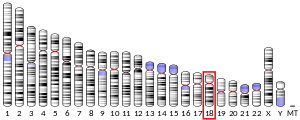SERPINB4
Protein-coding gene in the species Homo sapiens
| SERPINB4 | |||||||||||||||||||||||||||||||||||||||||||||||||||
|---|---|---|---|---|---|---|---|---|---|---|---|---|---|---|---|---|---|---|---|---|---|---|---|---|---|---|---|---|---|---|---|---|---|---|---|---|---|---|---|---|---|---|---|---|---|---|---|---|---|---|---|
| Identifiers | |||||||||||||||||||||||||||||||||||||||||||||||||||
| Aliases | SERPINB4, LEUPIN, PI11, SCCA-2, SCCA1, SCCA2, serpin family B member 4 | ||||||||||||||||||||||||||||||||||||||||||||||||||
| External IDs | OMIM: 600518; MGI: 3573933; HomoloGene: 76659; GeneCards: SERPINB4; OMA:SERPINB4 - orthologs | ||||||||||||||||||||||||||||||||||||||||||||||||||
| |||||||||||||||||||||||||||||||||||||||||||||||||||
| |||||||||||||||||||||||||||||||||||||||||||||||||||
| |||||||||||||||||||||||||||||||||||||||||||||||||||
| |||||||||||||||||||||||||||||||||||||||||||||||||||
| |||||||||||||||||||||||||||||||||||||||||||||||||||
| Wikidata | |||||||||||||||||||||||||||||||||||||||||||||||||||
| |||||||||||||||||||||||||||||||||||||||||||||||||||
Serpin B4 is a protein that in humans is encoded by the SERPINB4 gene.[5][6][7]
See also
References
- ^ a b c GRCh38: Ensembl release 89: ENSG00000206073 – Ensembl, May 2017
- ^ a b c GRCm38: Ensembl release 89: ENSMUSG00000044594 – Ensembl, May 2017
- ^ "Human PubMed Reference:". National Center for Biotechnology Information, U.S. National Library of Medicine.
- ^ "Mouse PubMed Reference:". National Center for Biotechnology Information, U.S. National Library of Medicine.
- ^ Schneider SS, Schick C, Fish KE, Miller E, Pena JC, Treter SD, Hui SM, Silverman GA (May 1995). "A serine proteinase inhibitor locus at 18q21.3 contains a tandem duplication of the human squamous cell carcinoma antigen gene". Proc Natl Acad Sci U S A. 92 (8): 3147–51. Bibcode:1995PNAS...92.3147S. doi:10.1073/pnas.92.8.3147. PMC 42122. PMID 7724531.
- ^ Sakata Y, Arima K, Takai T, Sakurai W, Masumoto K, Yuyama N, Suminami Y, Kishi F, Yamashita T, Kato T, Ogawa H, Fujimoto K, Matsuo Y, Sugita Y, Izuhara K (Feb 2004). "The squamous cell carcinoma antigen 2 inhibits the cysteine proteinase activity of a major mite allergen, Der p 1". J Biol Chem. 279 (7): 5081–7. doi:10.1074/jbc.M311585200. PMID 14630915.
- ^ "Entrez Gene: SERPINB4 serpin peptidase inhibitor, clade B (ovalbumin), member 4".
Further reading
- Barnes RC, Worrall DM (1995). "Identification of a novel human serpin gene; cloning sequencing and expression of leupin". FEBS Letters. 373 (1): 61–5. doi:10.1016/0014-5793(95)01015-7. PMID 7589435. S2CID 26092255.
- Bonaldo MF, Lennon G, Soares MB (1997). "Normalization and subtraction: two approaches to facilitate gene discovery". Genome Res. 6 (9): 791–806. doi:10.1101/gr.6.9.791. PMID 8889548.
- Bartuski AJ, Kamachi Y, Schick C, et al. (1999). "A murine ortholog of the human serpin SCCA2 maps to chromosome 1 and inhibits chymotrypsin-like serine proteinases". Genomics. 54 (2): 297–306. doi:10.1006/geno.1998.5586. PMID 9828132.
- Sakaguchi Y, Kishi F, Murakami A, et al. (1999). "Structural analysis of human SCC antigen 2 promoter". Biochim. Biophys. Acta. 1444 (1): 111–6. doi:10.1016/s0167-4781(98)00259-0. PMID 9931463.
- Cataltepe S, Gornstein ER, Schick C, et al. (2000). "Co-expression of the squamous cell carcinoma antigens 1 and 2 in normal adult human tissues and squamous cell carcinomas". J. Histochem. Cytochem. 48 (1): 113–22. doi:10.1177/002215540004800112. PMID 10653592.
- Luke C, Schick C, Tsu C, et al. (2000). "Simple modifications of the serpin reactive site loop convert SCCA2 into a cysteine proteinase inhibitor: a critical role for the P3' proline in facilitating RSL cleavage". Biochemistry. 39 (24): 7081–91. doi:10.1021/bi000050g. PMID 10852705.
- Uemura Y, Pak SC, Luke C, et al. (2000). "Circulating serpin tumor markers SCCA1 and SCCA2 are not actively secreted but reside in the cytosol of squamous carcinoma cells". Int. J. Cancer. 89 (4): 368–77. doi:10.1002/1097-0215(20000720)89:4<368::AID-IJC9>3.0.CO;2-6. PMID 10956412. S2CID 23697095.
- Hamada K, Shinomiya H, Asano Y, et al. (2001). "Molecular cloning of human squamous cell carcinoma antigen 1 gene and characterization of its promoter". Biochim. Biophys. Acta. 1518 (1–2): 124–31. doi:10.1016/s0167-4781(01)00174-9. PMID 11267667.
- Takeda A, Kajiya A, Iwasawa A, et al. (2003). "Aberrant expression of serpin squamous cell carcinoma antigen 2 in human tumor tissues and cell lines: evidence of protection from tumor necrosis factor-mediated apoptosis". Biol. Chem. 383 (7–8): 1231–6. doi:10.1515/BC.2002.136. PMID 12437110. S2CID 23972588.
- Strausberg RL, Feingold EA, Grouse LH, et al. (2003). "Generation and initial analysis of more than 15,000 full-length human and mouse cDNA sequences". Proc. Natl. Acad. Sci. U.S.A. 99 (26): 16899–903. Bibcode:2002PNAS...9916899M. doi:10.1073/pnas.242603899. PMC 139241. PMID 12477932.
- Gariboldi M, Peissel B, Fabbri A, et al. (2003). "SCCA2-like serpins mediate genetic predisposition to skin tumors". Cancer Res. 63 (8): 1871–5. PMID 12702576.
- Pontisso P, Calabrese F, Benvegnù L, et al. (2004). "Overexpression of squamous cell carcinoma antigen variants in hepatocellular carcinoma". Br. J. Cancer. 90 (4): 833–7. doi:10.1038/sj.bjc.6601543. PMC 2410161. PMID 14970861.
- Gerhard DS, Wagner L, Feingold EA, et al. (2004). "The status, quality, and expansion of the NIH full-length cDNA project: the Mammalian Gene Collection (MGC)". Genome Res. 14 (10B): 2121–7. doi:10.1101/gr.2596504. PMC 528928. PMID 15489334.
- Ray R, Choi M, Zhang Z, et al. (2005). "Uteroglobin suppresses SCCA gene expression associated with allergic asthma". J. Biol. Chem. 280 (11): 9761–4. doi:10.1074/jbc.C400581200. PMID 15677460.
- Rual JF, Venkatesan K, Hao T, et al. (2005). "Towards a proteome-scale map of the human protein-protein interaction network". Nature. 437 (7062): 1173–8. Bibcode:2005Natur.437.1173R. doi:10.1038/nature04209. PMID 16189514. S2CID 4427026.
- Sueoka K, Nawata S, Nakagawa T, et al. (2005). "Tumor-associated serpin, squamous cell carcinoma antigen stimulates matrix metalloproteinase-9 production in cervical squamous cell carcinoma cell lines". Int. J. Oncol. 27 (5): 1345–53. doi:10.3892/ijo.27.5.1345. PMID 16211231.
- Kimura K, Wakamatsu A, Suzuki Y, et al. (2006). "Diversification of transcriptional modulation: large-scale identification and characterization of putative alternative promoters of human genes". Genome Research. 16 (1): 55–65. doi:10.1101/gr.4039406. PMC 1356129. PMID 16344560.
- Katagiri C, Nakanishi J, Kadoya K, Hibino T (2006). "Serpin squamous cell carcinoma antigen inhibits UV-induced apoptosis via suppression of c-JUN NH2-terminal kinase". J. Cell Biol. 172 (7): 983–90. doi:10.1083/jcb.200508064. PMC 2063756. PMID 16549498.
External links
- The MEROPS online database for peptidases and their inhibitors: I04.009
- SERPINB4+protein,+human at the U.S. National Library of Medicine Medical Subject Headings (MeSH)
- v
- t
- e
- Alpha 1-antichymotrypsin
- Alpha 1-antitrypsin
- Alpha 2-antiplasmin
- Antithrombin
- C1-inhibitor
- Heparin cofactor II
- Protein C inhibitor
- Plasminogen activator inhibitor-1
- Plasminogen activator inhibitor-2
- Protein Z-related protease inhibitor
see also disorders of globin and globulin proteins
 | This article on a gene on human chromosome 18 is a stub. You can help Wikipedia by expanding it. |
- v
- t
- e
















